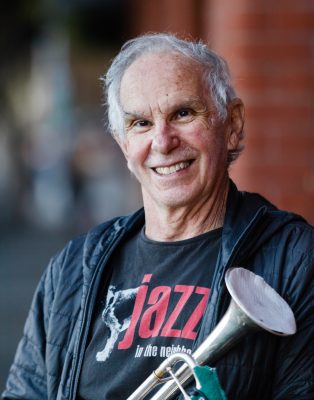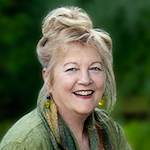Trumpet player and composer Mario Guarneri of Jazz in the Neighborhood teaches at the San Francisco Conservatory of Music in the jazz and classical music departments. The Conservatory equips students to play in symphony orchestras after graduation. For other genres, the path is often not as clear-cut. That’s why Guarneri chose to teach a class for students pursuing something different than a classical career, focused on how to get a gig after graduation.
Guarneri said, “I remember what an older veteran told me right after I graduated from college. He said, ‘well, you’re no longer a kid sitting in; you’re just another one of us out here trying to get work.’ That stayed with me.”
Making a full-time living as a musician has always been difficult. The shrinking availability of performance spaces makes it even more challenging in Marin’s post-COVID economy.

As someone who took trumpet lessons from an early age and played on stage at the age of 13 with Louis Armstrong and his band, Guarneri understands the value of mentoring. Jazz in the Neighborhood created their Emerging Artists Program to provide aspiring jazz musicians with an opportunity to take part in the time-honored tradition of learning on the bandstand.
COVID has impacted this program’s progress, but the hope is it will flourish in the future once bandstands are thriving again.
“Learning on the bandstand has always been a huge part of the jazz tradition,” Guarneri explained. “We’ve had somewhere between 15 and 30 emerging artists, young people coming out of high schools or college programs, join us. Some of those kids have now become young professionals. Apprenticeships exist in other fields but not for musicians.”
When vocal jazz artist Audrey Moira Shimkas considers Marin music venues, she first thinks of rock and roll and country music. She got a big break early on as a jazz musician, although she loves to combine many different genres. When she plays what she wants to play as an entertainer, she has a couple of country tunes, then some rock and roll tunes, though all done in a jazzy kind of way. She likes to mix up genres.
She said, “I’d almost just started, and there was a Yoshi’s in San Francisco for a while on Fillmore St. The owner heard me, and he liked me. So, I was booked in what they called the jazz lounge, not the main stage, for about 2 1/2 years on a monthly rotation with a quartet, and they paid me.”
In 2020, she had a whole calendar year of gigs lined up, and they all went away due to COVID. Some of the venues, like Hilltop, the Panama Hotel, and Jason’s in Greenbrae, just completely went out of business. When things started back up, even seasoned musicians were willing to get back to making music. They played for a lot less than they would usually play for, often just for tips.
“Remember that music is extremely technical and it takes a lot of studying. It’s not just about memorizing lyrics or playing songs. So much actual studying goes into being a musician and being a good one.”
– Qiana Hester
Earlier in her career, she did a lot of sitting in with other musicians. There were places at that time she could go to sit in, and she imagines there probably are today, too. After sitting in with different musicians, she made a small CD for $100 and got that first gig which led to the second and so on. For her first gig, she received $50 and split it with her piano player.
As she gained confidence and felt she could ask for more, Shimkas also looked at things like whether a venue provides equipment, a sound system so she wouldn’t have to lug around her PA system.
Shimkas added, “I had a gig at Mac’s at 19 Broadway in Fairfax in January. They are in that 1926 building. It was a dive bar for many years. Someone bought it and invested a lot of money into renovating that old building and then opened it up about six or so months ago. Now, they have a piano bar, and they have a real stage with a grand piano.”
For Shimkas, it’s still a matter of knocking on doors.
Seventeen-year-old Qiana Hester admits, “I’ve been onstage kind of my whole life, the first time at the age of five. I come from a musical family. I’m known to be more of a jazz artist, but I am also in a rock band, but it’s not just primarily rock music. We do a wide variety of music, sometimes jazz-influenced. I have performed a couple of times at HopMonk and Sweetwater, which is a marvel.”
Hester doesn’t feel there is a well-traveled path for emerging musicians to follow in the very competitive music industry. She wants to pursue music in the future and recently got accepted to Berklee College of Music in Boston. She is excited to see where that might take her, as she knows there will be a lot of twists and turns since it is a challenging career to pursue.
Not one to sit back and take anything for granted, Hester has been working since she was 14. She works two jobs: an assistant manager at IHOP and a childcare worker in an after-school daycare program she runs Monday through Friday.
She plans to get a degree in vocal jazz and then get a teaching credential. If performing doesn’t work out ultimately or is not making enough money, she can teach. She said, “I also do have a huge passion for teaching.”
Her advice to other emerging musicians is, “Remember that music is extremely technical and it takes a lot of studying. It’s not just about memorizing lyrics or playing songs. So much actual studying goes into being a musician and being a good one.”
Mario Guarneri of Jazz in the Neighborhood agrees that being a musician is a profession that requires dedication and education. That’s why he wants to see musicians get a decent wage rather than being reduced to playing for tips. Guarneri would also like to see more support coming from local schools, though he is grateful that teachers let their students know that his Emerging Artists Program and others like his that exist to help emerging musicians learn the skills to build their career, especially during these challenging times as music venues are struggling.

Kate Fitzsimmons is a freelance writer and fund development professional. Her writing skills were honed as a Contributing Editor to The San Francisco Review of Books where she interviewed John Updike, Joyce Carol Oates, Bobbie Ann Mason, Alice Walker and others. She works with businesses, nonprofits and entrepreneurs to assist them in raising their visibility through their stories. When she isn’t writing, she is cooking for friends, collecting art or engaged in a good novel.